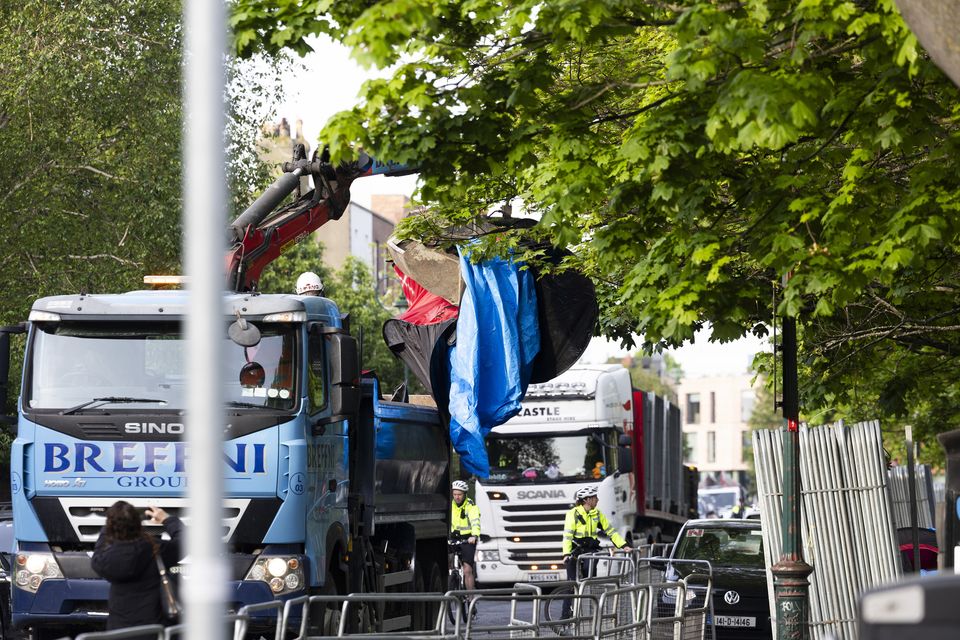Government to put urgent focus on producing state land and properties for arriving migrants
Plans being made to source sites as ‘tent city’ cleared in Dublin
Tents along the Grand Canal being removed as people were transferred to centres. Photo: Collins
The Government has said it will put an urgent focus on finding suitable sites for accommodation of asylum-seekers to avoid a repeat of tented encampments that have twice been cleared in Dublin city in the past week.
HSE properties, land owned by the Department of Defence and sites previously ruled out for housing are among the state-owned sites to be considered, a meeting of Taoiseach Simon Harris and agencies involved in the asylum system was told yesterday, on a day in which an encampment of migrants in around 100 tents was dismantled along the Grand Canal.
The tents had been erected close to where the previous “tent city” had grown for a year outside the International Protection Accommodation Office on Mount Street, before it was cleared last week.
At the meeting, the Taoiseach was adamant a “silo approach” by government departments – whereby the problem is largely left to Roderic O’Gorman’s integration officials — is to “stop now”.
A spokesman said the urgent focus would be on freeing up more state land for accommodating arrivals.
This would even include sites scoped out by the Land Development Agency for housing, but not thought suitable for such development.
A particular target appears to be brownfield sites close to the city centre because that is where arrivals want to congregate.
A source close to the multi-agency meeting after the Grand Canal operation early yesterday morning said: “There is acute consciousness that the feeling among migrants seems to be that the quickest way to get dealt with is to join such a setting.”
There have been no legal efforts made at this point to ensure migrants remain in a designated location and they remain free to move.
The Department of Justice confirmed it was not looking at any such ideas.
There is also no evidence that migrants are co-ordinating the establishment of tented encampments in order to deliberately confront the Government, officials said.
Sources poured cold water on claims made in the Dáil that clumps of tents had sprung up in Ringsend and East Wall less than six hours after the clearance of the Grand Canal site.
Read more
Both areas have proved to be flashpoints and gardaí have acted promptly to move on migrants in tents in both locations, the Irish Independent was told.
Social Democrats TD Jennifer Whitmore told Tánaiste Micheál Martin that former tent settlements had been fenced off, but it was hardly possible to fence every street and road.
As Mr Martin attempted to explain the Government’s new approach, she said: “I hope you have a large supply of fences, Tánaiste.”
A government commentator noted that there had been 40 tents at the Grand Canal after the bank holiday, rising to 100 on Wednesday, with 168 individuals present when the clearance was carried out yesterday.
He stressed the multi-agency move was “humane” and there had been no resistance, although one person requested medical aid, which was granted.
The tents were removed and will be disposed of, as their occupants were told once belongings were removed. They were taken to new facilities at Crooksling and Dundrum.
“The pressure isn’t stopping,” said a spokesman for the Taoiseach, referring to the migrant flow.
“We are seeing high numbers [of arrivals] and that will continue. The answer in the short term is state land. But the Taoiseach has sent a strong signal that tent cities will not be tolerated.”
Sinn Féin spokesman Pearse Doherty said the Government was limping from crisis to crisis.
There was no coherent strategy or thorough plan, he claimed, suggesting that next week the State would be “facing a similar situation with another 100 tents anywhere else across the city”.
The Tánaiste replied that tent cities were “not sustainable” and “not acceptable”, adding: “There is a plan resolutely to deal with tents wherever they arise.”
The wider plan was to deal with the increase in numbers.
“Applications are now being assessed in record time. The number of applicants from safe countries has fallen by 50pc,” he said.
“There’s a new system to respond quickly to any upsurge from one country. And there’s been an almost 100pc increase in international protection staff since 2022.”
Accommodation was being addressed as part of the strategy, he said.
However, the tent camps being seen in the city were not tolerable and Mr Martin said: “We’re going to continue to focus on it.”
Join the Irish Independent WhatsApp channel
Stay up to date with all the latest news

.jpg)













